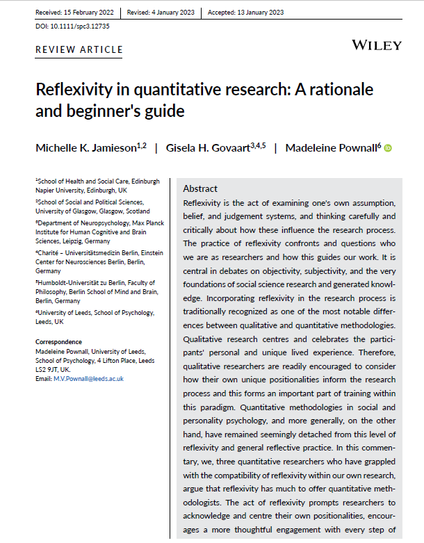Helpful roundup by Mirjam Glessmer of recent pieces on #positionality statements and reflexivity in research
#Positionality
📢 NEW BLOG POST | 'I' am here! The necessity of acknowledging the historian in scholarship.
Kicking off our new series on positionality and bias! Through personal reflections, our team explores how acknowledging our own perspectives leads to stronger, more transparent scholarship.
Team member Amber has written the first blog, reflecting on her experiences (and challenges) with positionality.
Read it here! https://combattingbias.huygens.knaw.nl/news/positionality/
@ChrisMayLA6 Highlighting the importance of #positionality is one of the great contributions of #feminist research. What is #Reeves ' background? - and what are the rules for punctuating hashtags?
For archives and libraries folks: Should descriptive metadata record the processes by which collections have been described? I've been arguing that it's important for finding aids to include information about who created the descriptions and how they've been revised over time.
An article I wrote came out last month: "Archival meta-metadata: revision history and positionality of finding aids"
https://doi.org/10.1007/s10502-024-09443-z
Choux Questionnaire
with ChatGPT
David Szanto
#ChouxQuestionnaire #ChatGPT #Positionality #FoodVoice
#Read all you want! #OpenAccess
#Share generously! #KnowledgeSharing
#Grow your understanding of #Food
#Repeat
https://canadianfoodstudies.uwaterloo.ca/index.php/cfs/article/view/688
Choux Questionnaire
with ChatGPT
David Szanto
#ChouxQuestionnaire #ChatGPT #Positionality #FoodVoice
#Read all you want! #OpenAccess
#Share generously! #KnowledgeSharing
#Grow your understanding of #Food
#Repeat
https://canadianfoodstudies.uwaterloo.ca/index.php/cfs/article/view/688
@cgervasi
i get your point, but plenty of academics are already onto a better solution: including #positionality statements, which effectively outline your #intersectional background and potential biases as an author (which of course, are never exhaustive as no one has perfect self-awareness). this helps us train each other to think of the different lenses we wear when witnessing something, or recounting, or hearing second- or third-hand. in turn, we can craft better feedback if there are inaccuracies or missing nuances, extend grace as appropriate, etc. objectivity really is a myth, and the sooner more people realize, acknowledge, and promote that, the better off we’ll all be.
@dangillmor
In case you are doing a PhD in #MediaStudies or a related field, work on and with #Data and have some time to spend in mid-September:
More Than Data: #Positionality and #Situatedness in Digital Media Research Summer School
Organised by the CRC Media of Cooperation, University of Siegen, 18–22 September 2023
https://www.mediacoop.uni-siegen.de/de/veranstaltungen/more-than-data-summer-school/
"Reflexive practices are intended to help researchers to consider how their position may have detrimental or underappreciated influence on a study. There is perhaps no field in better need of such reflection than data science."
Cambo and Gergle, Model Positionality and Computational Reflexivity: Promoting Reflexivity in Data Science, https://doi.org/10.1145/3491102.3501998
Argument that #journals should require #OpenScience, not author #positionality statements.
https://www.chronicle.com/article/ideological-signaling-has-no-role-in-research
(#paywalled)
"If we suspected the quality of [a given piece of] research, transparent #OpenData could allow other researchers of any background to thoroughly fact-check it. But the authors’ assurances that they are antiracist, intersectional feminists tell us only that they are on the 'right' team."
Reflexivity is not just for qualitative researchers:
“In this paper, we make the case for integrating reflexivity across all research approaches, before providing a ‘beginner's guide’ for quantitative researchers wishing to engage reflexively with their own work.”
Jamieson et al. (2023):
Published (shareable?) version: https://compass.onlinelibrary.wiley.com/share/SU2KRDNH8NGVDQ2IZYFX?target=10.1111/spc3.12735
Preprint: https://doi.org/10.31234/osf.io/xvrhm
@socialpsych
#OpenScience
#MetaScience
#ResearcherBias
#Reflexivity
#Quantitative
#Qualitative
#Positionality
That’s me done for the day. I spent this afternoon writing about having an invisible disability researching other people with invisible disabilities; I can’t easily hide that I am white, female, middle class and English, but I could, and often do, hide my identity as a disabled person at work. Trying to unpick this #positionality #reflexivity #qualitativeresearch #disability #identity
I spent the afternoon following up references for my #positionality and #reflexivity paper. I wanted to talk about #intersectionality as race, gender and class have all impacted on my #fieldwork, but I’m not sure there’s room. I might end up having to just talk about #gender OR #class, IDK #qualitativeresearch #criminology
